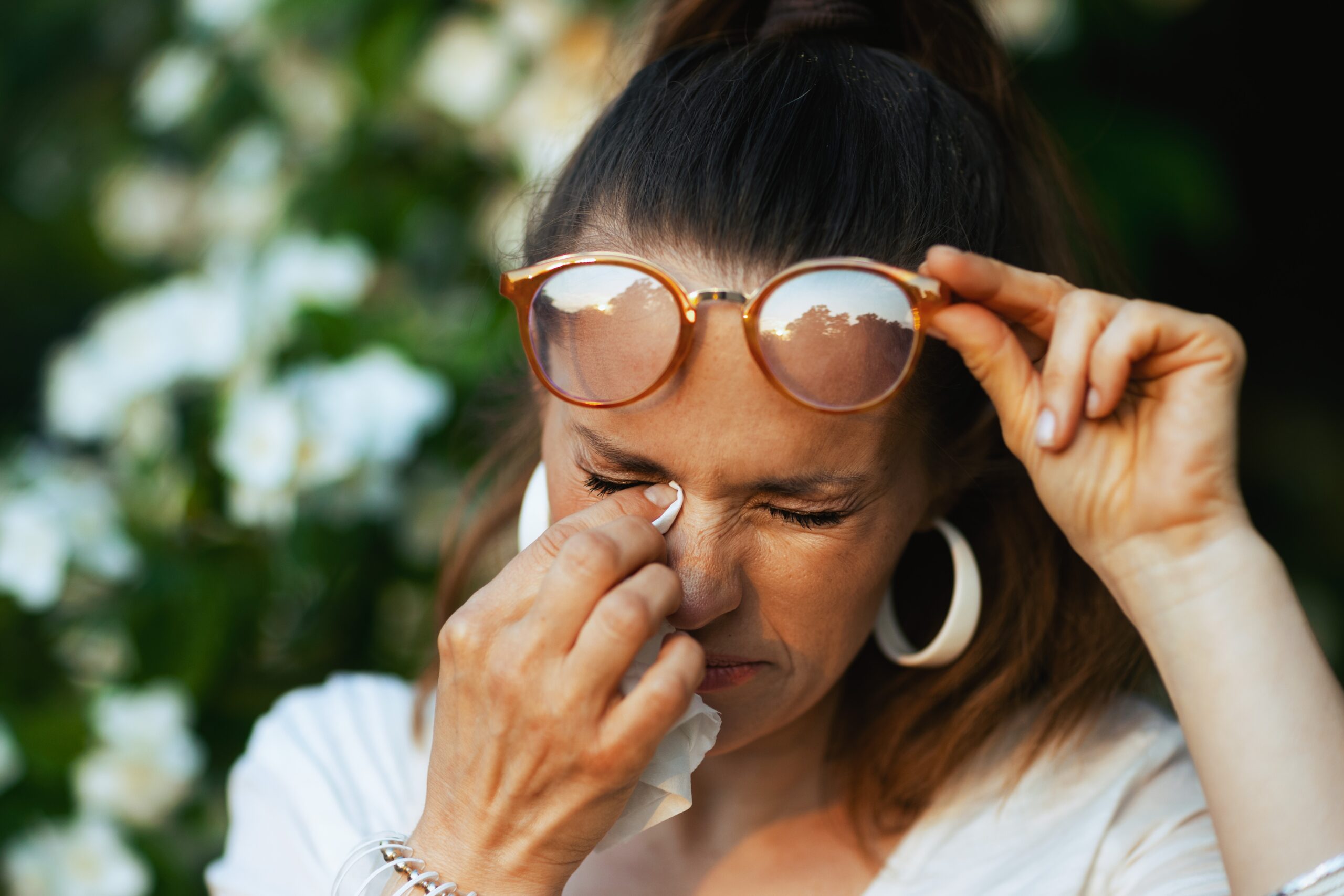Home » When East Tennessee Allergies Attack Your Eyes
If your eyes feel itchy, red, watery, or just plain miserable every time spring rolls around—or when fall leaves start turning—it might not be “just you.” In East Tennessee, seasonal allergies don’t just stuff up your nose. They wreak havoc on your eyes. And if you live in places like Knoxville, Morristown, or Lenoir City, you probably already know: allergy season here hits different.
But why are your eyes so affected? And what can you actually do about it—besides carrying around tissues and trying not to rub your eyes raw? Let’s break it down.

It’s not your imagination. National allergy reports routinely rank cities in our region—especially Knoxville—among the worst in the country for seasonal allergies.
Why? A perfect storm of high pollen counts from a long growing season, abundant tree species like oak, birch, and cedar, humidity and moisture that stir up mold spores, and mountain valleys that trap allergens close to ground level.
So whether you’re hiking in Harriman, walking the dogs in Powell, or sitting through soccer practice in Morristown, your eyes are constantly exposed.
You might assume you’re just tired, staring at screens too long, or fighting off a cold. But allergy-related eye symptoms are distinctive.
Itching is one of the most classic symptoms. If your eyes itch more than they hurt, allergies are likely. Other common signs include redness—especially around the whites of the eyes or along the eyelid edges—and tearing or watery eyes as your body tries to flush out the irritant. Swelling or puffiness may appear in the upper eyelids or under the eyes. Many people also describe a burning sensation or general irritation and light sensitivity.
Importantly, allergies don’t usually cause discharge (like yellow or green gunk) or pain. If you’re seeing those, it may be something more serious like conjunctivitis or an infection.
In East Tennessee, there are two major culprits: seasonal pollen and airborne mold spores.
In spring (March through May), trees like oak, maple, and birch release fine pollen that irritates eyes, especially on warm, breezy days. In summer (June through August), grasses like Bermuda and Kentucky bluegrass take over, along with mold from summer rains—especially in shaded, damp areas like Harriman’s forested parks. Fall (September through November) brings ragweed, a notorious allergen that lingers until the first hard frost, along with continued mold due to falling leaves. Even in winter (December through February), indoor allergens like dust mites and pet dander can cause problems, particularly when windows are closed and heating systems circulate air.
It’s not just pollen in the wind. Everyday activities can trigger eye allergies. Cutting the grass in Powell might stir up mold and spores. Opening windows in Lenoir City for a spring breeze invites pollen indoors. Cleaning out a damp shed or garage can expose you to mold spores. Even scented cleaners or air fresheners can cause allergy-like symptoms for some people.
Contact lenses can make it worse by trapping allergens against your eyes for longer periods.
You don’t have to suffer all season long. Here are practical ways to prevent and relieve symptoms.
If you normally wear contact lenses, switching to glasses during peak allergy months may improve comfort. Contacts can trap allergens and may become uncomfortable due to extra tear production or dryness. Rubbing irritated eyes with contacts in increases the risk of corneal abrasions or infection.
Wearing glasses creates a partial barrier and reduces direct exposure to airborne irritants. If contacts are necessary, daily disposable lenses can help minimize buildup.
Children in East Tennessee are no strangers to seasonal eye issues. They often struggle more because they may not recognize or articulate their symptoms clearly.
Watch for frequent eye rubbing, swollen or red eyes after outdoor play, and complaints about blurry vision. If your child in Knoxville or Lenoir City is struggling to focus in class or avoiding reading, allergy-related eye discomfort could be the cause.
Sometimes what looks like an allergy is actually a sign of another eye condition. You should see an eye care provider if you experience sudden vision changes, thick discharge, pain, or if symptoms affect only one eye. If discomfort continues even when pollen counts are low, it might be dry eye disease, blepharitis, or an infection.
If your eye allergies are interfering with your daily life—or if you’re unsure whether it’s truly allergies—it’s worth getting checked. Residents of Knoxville, Powell, Lenoir City, Morristown, and Harriman have access to local care from professionals who understand the specific environmental challenges in this region.
The team at Tennessee Eye Care offers trusted service and personalized treatment plans that can help relieve allergy-related eye symptoms and ensure your long-term vision health. Whether you’re facing seasonal discomfort or need help managing a chronic eye issue, they’re here to help. Contact us today!